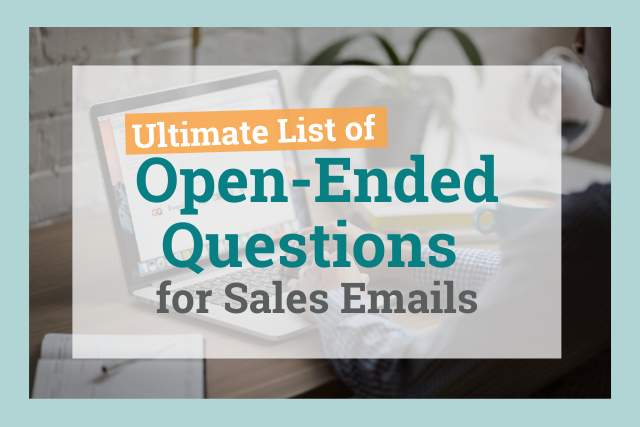
You might think that questions aren’t an important part of sales. But sales shouldn’t be a one-sided rant of all the benefits of your product. Instead, it should be a conversation. And the best way to start a conversation and keep it going is by asking open-ended questions.
This guide will cover the difference between open and closed-ended questions. We’ll also cover how to use strong questioning techniques in your sales communications.
Let’s dive in!
- What’s the Difference Between Open-Ended and Closed-Ended Questions?
- Why Should I Use Open-Ended Questions in Sales Emails?
- What Makes an Open-Ended Question Good or Bad?
- What Is an Example of an Open-Ended Question?
- What Is an Example of a Closed-Ended Question?
- What Are Good Open-Ended Questions to Ask When Starting an Email Conversation?
- How Do You Answer Google’s Crazy Open-Ended Interview Questions?
What’s the Difference Between Open-Ended and Closed-Ended Questions?
You might not think much about the questions you ask every day, especially in your work. But understanding the difference between open- and closed-ended questions can improve your communication with clients, colleagues, and even your loved ones.
Today, we’re focusing on using open-ended questions in sales.
What Is an Open-Ended Question?
Questions are ways for us to gain information from others. An open-ended question is a question that invites the other person to share more detailed information, beyond "yes" or "no".
It’s a question that requires a longer answer. It can’t be answered with one word or phrase. Open-ended questions are how we keep conversations flowing.
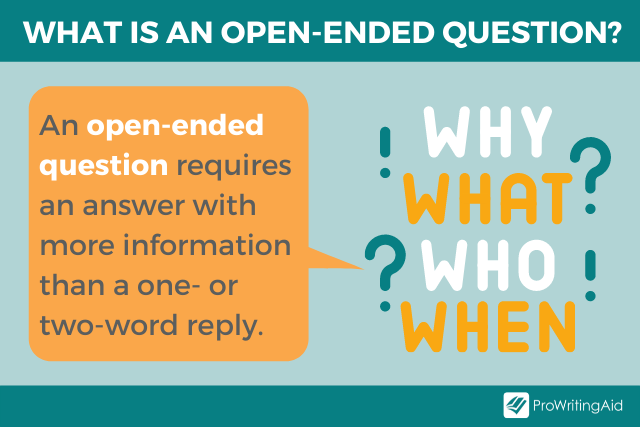
What Are Closed-Ended Questions?
On the flip side, closed-ended questions require only short answers—often just one word. They close the track of the conversation.
Many closed-ended questions are answered with "yes" or "no." But other short phrases, such as "maybe," "sure," "I don’t know," or "fine" are also potential answers to closed-ended questions.
If you’ve ever asked a teenager how school was, you know how quickly closed-ended questions shut down a conversation.
Did you have a good day? Yes. How was math class? Fine. Do you have homework? I don’t know.
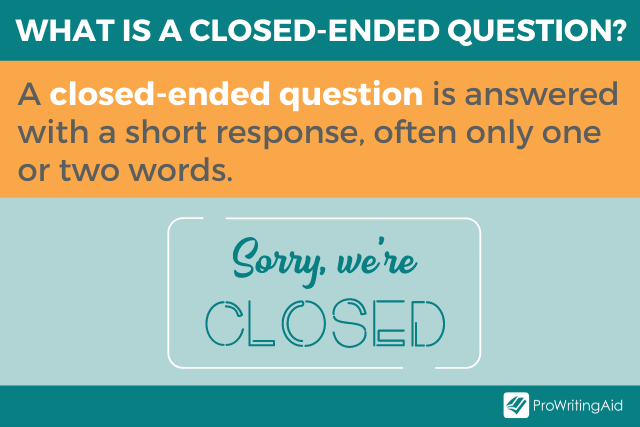
Closed-ended questions are easy to come up with. The answer doesn’t have to be one of those common answers listed above. A close-ended question can be any question that just doesn’t give you much to go on for your answer.
Remember, an open-ended question gives you more information to continue the conversation, but a closed-ended question is harder to follow up.
Let’s say you ask me where I work, and I say, "ProWritingAid."
Well, a company has many different roles, and this answer doesn’t give you much information about me.
A better, more open-ended question would be, "What do you do for a living?"
This question invites me to tell you that I’m a writer, and I write articles for ProWritingAid. You now have more information to continue the conversation. You might ask me what type of articles I write, how I became a writer, or what exactly ProWritingAid does.
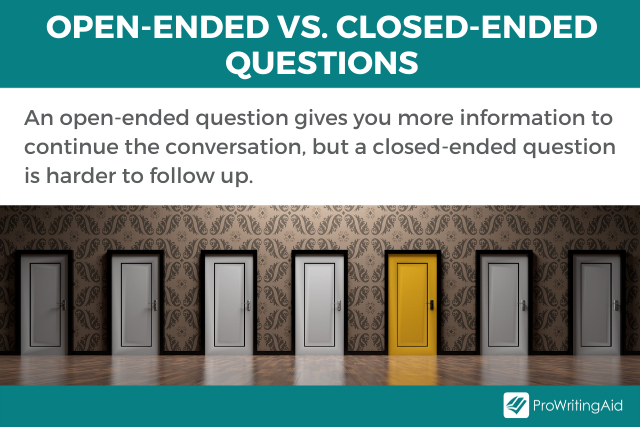
Now that you know the difference between open-ended and closed-ended questions, let’s talk about why this concept is so important in the world of sales.
Why Should I Use Open-Ended Questions in Sales Emails?
If you’ve ever walked by a sales kiosk at the mall, you’ve probably experienced someone coming up to you and asking you a question in order to sell something to you.
Questions like "Do you want to try this?" or "Are you happy with your electricity provider?" are easy to ignore. You can give a simple one-word answer and walk away.
You have to build a relationship to be a successful salesperson. No, that doesn’t mean you have to invite your client over for family game night. But it does mean you need to have a conversation with your potential customer. Open-ended questions are the best way to build that relationship and keep that conversation going.
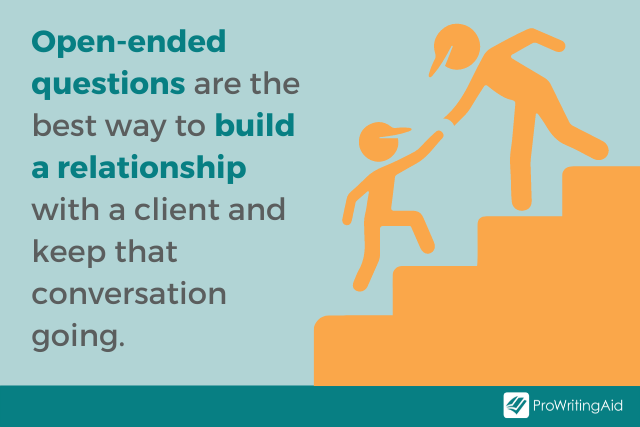
Open-ended questions allow you to discover important information about your potential customer. You need to find out what your client needs and how you can offer them a solution.
They might not even be aware they have a problem that needs solving! You can’t help them without good open-ended questions.
What Makes an Open-Ended Question Good or Bad?
A good open-ended question helps you identify a problem so you can offer an appropriate solution to your customer. A bad open-ended question doesn’t give you any useful information.
Let’s say you’re trying to sell me a computer.
You ask me what computer I currently have. I tell you that I have a Lenovo IdeaPad. Now what?
Unless you know the ins-and-outs of every computer on the market, you have no specific, useful information to build a pitch around. You don’t know how much RAM I have or how fast my processor is. You don’t know if I use it for work or gaming or streaming.
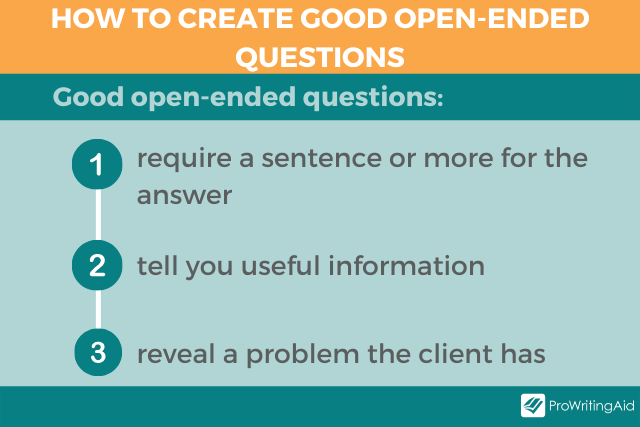
Now imagine instead that you ask me what I like about my computer and what I dislike.
That immediately helps you know which of your products I might like. Then you ask me how I use my computer and what I spend most of my time doing on it. What features do I want? What features are deal breakers? What is my budget?
You get the idea. Open-ended questions show that you are listening to the customer’s needs and wants. This builds their trust in you, and it helps you find the most appropriate solution.
What Is an Example of an Open-Ended Question?
Ready to test your knowledge? Here’s your scenario: an elderly woman is shopping for a new phone. Which of these questions is the best open-ended question to ask her?
A. Do you prefer Apple or Android?
B. Do you like your current phone?
C. What are you hoping to do with your new phone?
D. How long have you had your current phone?
If you said C, you’re correct. The other questions are closed-ended questions because they only require a one- or two-word answer.
But if you ask her what she wants to do with her new phone, she’ll tell you that she wants to be able to video call with her family and get on Facebook to look at pictures of her grandkids.
That answer gives you plenty of openings to discuss the merits and shortcomings of potential phone choices, leading her to a successful choice.
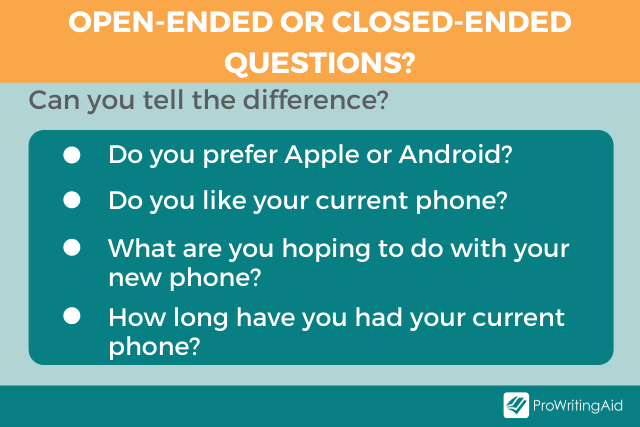
What Is an Example of a Closed-Ended Question?
Using the same scenario as above, we know that the other questions are closed-ended questions. Here’s why.
If you ask if she prefers Apple or Android, you know that she will answer with yes, no, or I don’t know. That doesn’t mean it’s not a valuable question to ask! She might only want an iPhone. But it doesn’t open the conversation for you to problem-solve.
Do you like your current phone? Again, that’s a yes or no question. You can make this open-ended by asking her what she likes about her current phone or what features she wants her new phone to have.
Asking how long she has had her current phone also doesn’t give you much information. It doesn’t matter whether she’s had it six months or ten years. She needs a new phone, and she needs you to help her find the right one.
What Are Good Open-Ended Questions to Ask When Starting an Email Conversation?
Now that you know what open-ended questions are and why you should use them in sales, you’re probably wondering how to deploy this tactic.
It’s important to note that the idea of "good" and "bad" questions is subjective. What makes a question subjective or not will depend on your company and what you’re selling.
In sales emails, it’s crucial to ask questions that will give you the most bang for your buck. Frame open-ended questions in your sales emails in a way that you get as much information as possible about what the customer needs and wants.
Below are some examples of open-ended questions that might be beneficial when you’re talking to a new client.
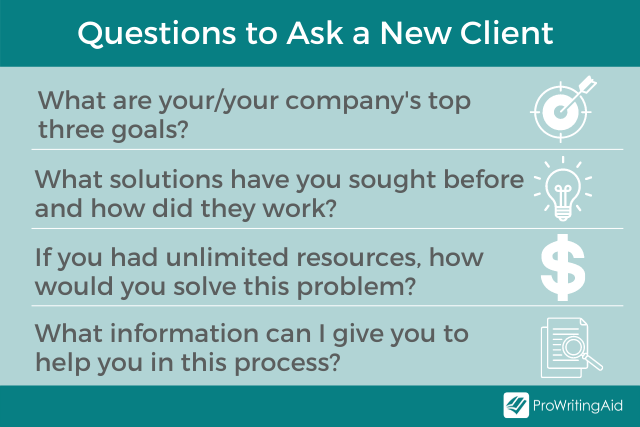
- What are your/your company’s top three goals?
- What is the biggest challenge you face every day?
- What solutions have you sought before and how did they work?
- What is your idea of the perfect [product or service]?
- If you had unlimited resources, how would you solve this problem?
- What information can I give you to help you in this process?
- Are there any deal breakers when it comes to a [product/service]?
- What features are missing from your current [product/service]?
- Can you explain how you would use [product/service]?
- Why did you seek out our company specifically?
In sales emails, it’s crucial to ask questions that will give you the most bang for your buck. Frame open-ended questions in your sales emails in a way that you get as much information as possible about what the customer needs and wants.
Eventually, you’ll get a sense of the questions that work best for your customer base, and will begin using them frequently.
How Do You Answer Google’s Crazy Open-Ended Interview Questions?
Open-ended questions aren’t just for sales! They are helpful for customer service, networking, and interviewing, too.
Google has a reputation for asking some of the toughest open-ended questions in their interviews. After all, they receive three million applications a year! That's more than the entire population of New Mexico. They hire about 6,000 people a year, so they really have to find the best candidates.
For a long time, Google’s interview questions were wild and seemed to have nothing to do with working at Google. Here are a few examples:
- How tall is the Empire State Building?
- A man pushed his car to a hotel and lost his fortune. What happened?
- How much should you charge to wash all the windows in Seattle?
- How would you calculate how many golf balls fit in a school bus?
If this sounds like a test-taking anxiety dream, you aren’t alone. But these answers didn’t require a right or wrong answer. Instead, Google wanted to explain the process of coming up with these answers. They were testing your critical thinking skills.
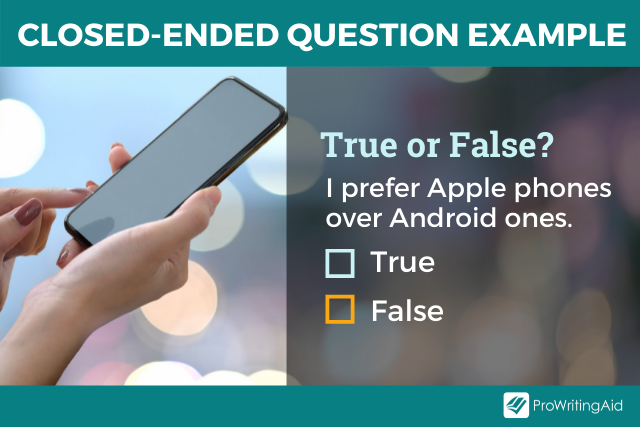
Let’s take a look at the one about washing the windows in Seattle.
A possible answer might be, "Well, first I would find out the going rate for window washers in Seattle. Then I would find the population of Seattle to come up with the average number of homes. I would also find the average number of businesses in a large city. I’d look at how many skyscrapers Seattle has. Then I’d calculate the number of windows based on these averages, estimate that each window would take me 30 seconds to wash, factor in supplies, and set a realistic hourly rate. I’d multiply that by the number of hours I estimate it would take me."
The answer to that open-ended question gives the hiring managers at Google a ton of information about how you solve problems.
Thankfully for prospective candidates, Google has gotten rid of these random questions. They found that these questions really didn’t dictate how good a person would be as an employee. All they did was make people nervous!
Google still asks hard, open-ended questions in interviews, but these questions now actually apply to the job positions.
Keep in mind that when you ask open-ended questions: you want the customer to tell you as much about what they need as possible. You want them to bring the problem to you so you can solve it.
Or you can ask them how tall the Sears building is, but it probably won’t get you a sale.


